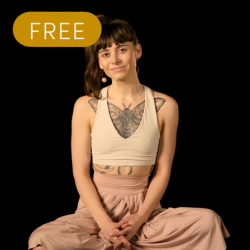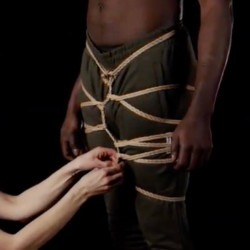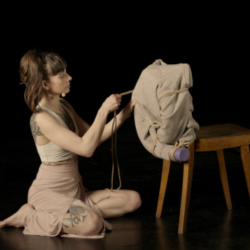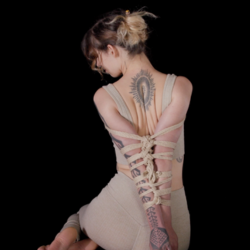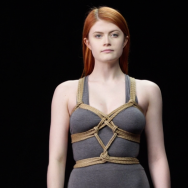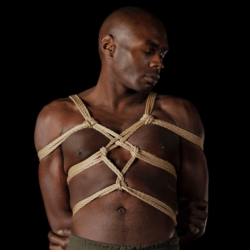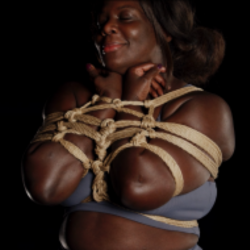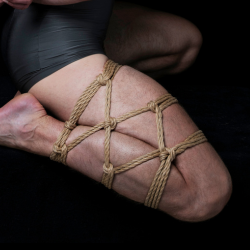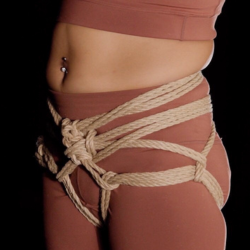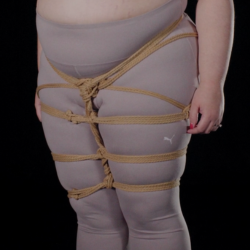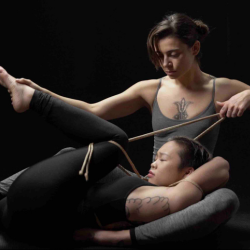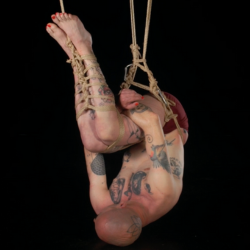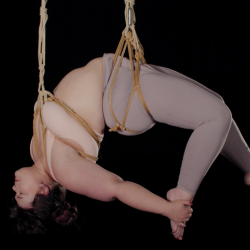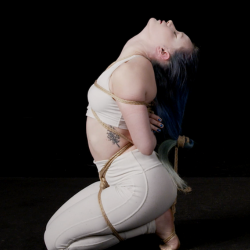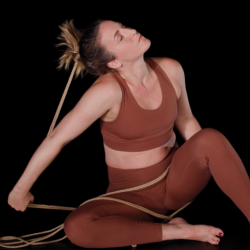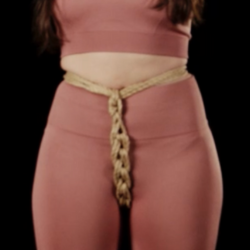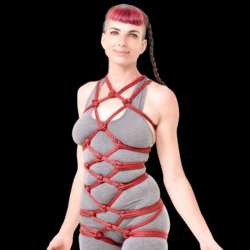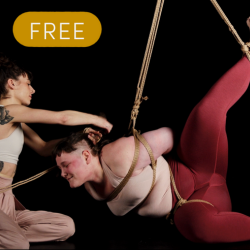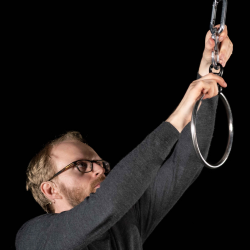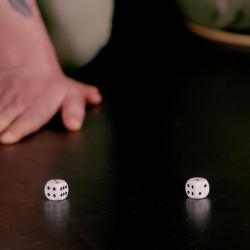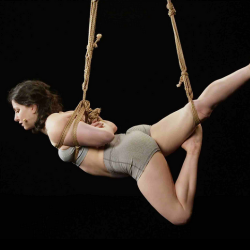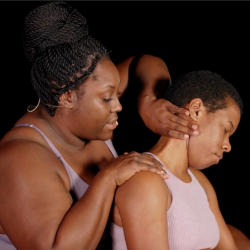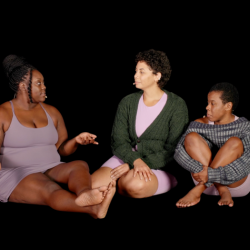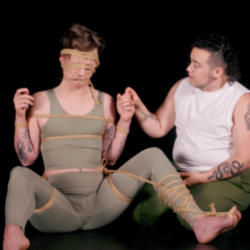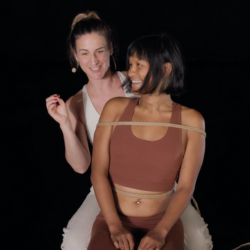EP 33
KATA
Kata discusses their journey into shibari, blending spirituality and bodywork. They reflect on fostering community, challenges of organizing workshops, and the intersection of rope bondage with Tantra. Kata emphasizes mindfulness, presence, and ongoing self-improvement.

Kata (he/she/they) has been touching and trying to understand and learn "all" about touch their whole life.
They are a touch professional, genderfluid (rope)switch, bodyworker, explorer, learner and forever evolving in this (mostly) human form.
Originally from Austria, lived in Iceland for 8 years where they discovered ropes and the passion to work with and for the human body again.
They went on to connect to the spiritual communities there as well as the BDSM community and built a rope community and created Spektrum Reykjavik and Reykjavík Ropes,
these spaces were born to weave together and offer all those things that they love, experience, enjoy, research and study.
Recently moved back to the south of Austria, connecting to their own roots and to the diverse communities there. Learning even more about the human body, studying physio/medicinal massage and sexological bodywork (in Zurich).
Working with holistic bodywork, offering rope classes and sessions as well as continuing to collaborate with different photographers, rope artists and Finnish movement and dance artist Kaisa Kukkonen on their mutual research about touch.
Instagram: @littleredridingtree, @spektrum.reykjavik, @reykjavikropes
[00:00:09] Wicked Wren Hello to all my guys, gals and non-binary pals and welcome to the Shibari Study Podcast. I'm your host Wicked Wren. Shibari Study is an online learning resource offering video tutorials for beginners through advanced practitioners. Whether you're brand new to the world or Shibari and needing to learn the basics, or a seasoned rigger or rope bottom seeking inspiration to push your practice to new places, there's something for you at shibaristudy.com. Today, I'm talking to Kata. Kata uses they/them pronouns. They're a rope switch. They're living in Austria. They're a body worker and a witch. Kata has also developed the rope community in Iceland. They were the spark of it in the beginning. It might feel weird to say that you were the founder of it, but you were definitely the kind of spark that stoked the fire, if you will.
[00:01:04] Kata Yeah, yeah, I would, I would say that. Hi.
[00:01:07] Wicked Wren Hello. How are you?
[00:01:08] Kata So nice to be here. I'm good, I'm good. Yeah, I would say, like, when I found my interest in ropes when I was in Iceland, I definitely, like, it, it was like such a big spark for me that it just kind of started a fire there, I would say.
[00:01:27] Wicked Wren Totally.
[00:01:28] Kata I was so, I was so excited about having found ropes that I wanted everybody to join in and, everybody who wanted, you know.
[00:01:36] Wicked Wren I want to talk about that in a bit. But, I have two things that came to mind immediately is you're a self-proclaimed witch, which I would love to dig into. What does that mean?
[00:01:49] Kata Oh, for me, oh, that means so many things. So for me, it's about my own spiritual practices, like... I do rituals. I'm, I try to stay connected to nature and also to my body because my body is nature. So I try to, like, live in a way where I go to nature often to recharge. I go to do rituals. I do rituals with myself. I meditate. I try to perceive as much as possible and to use nature and, and meditation and rituals to understand myself better and my surroundings. I guess.
[00:02:35] Wicked Wren It's amazing. You made this really beautiful photo with Tam and you tied... It looks like deer antlers on his back. Yeah, and he's in a strappado. Yeah, what...
[00:02:47] Kata Yes. It was, it was amazing. When Tam was visiting Iceland to teach, we had really, like, great opportunity to to work with Daria and Anderson. I think her name is Anderson. She's from Norway, and she lives in Iceland, and she's an amazing photographer. And she actually came up with the idea of using antlers, and we weren't sure what we were going to do with it, but it was really like a collaboration of me and Tam and her, trying to figure out what to do. And this came out of it and it's just such an amazing picture of him. Yeah. I love it.
[00:03:20] Wicked Wren It's incredible. Is there any symbolism with the antlers?
[00:03:26] Kata I mean, I guess everybody could read into what they want. There's many, many possibilities of how you would want to interpret that. I don't know. For me, I didn't really think so much about it. Like, I didn't want to find an explanation for it. For me, the picture itself, it just felt so strong, like, you know, the fragile hands in the back and everything. For me, it's more about the feeling of it than trying to find, like, the symbolism or an explanation behind it.
[00:04:02] Wicked Wren It's a really cool way of putting that. When I see that photo, I look at Tam's hands immediately and it shows how cold it was. I mean, it feels like it was cold that day.
[00:04:12] Kata Yes, it was freezing. But, you know, Tam is really like... He's, he's, he's a tough model. He... Yeah, he was, he was doing really, really well. I mean, like, we did try to, like, keep him warm afterwards and before, like, we had mittens on him. Like when, when we were tying it. And then until we took the photos, they were like mittens. And I think there's a picture of it somewhere. That was really funny. Yeah. We take, we took care of him.
[00:04:42] Wicked Wren I love it. I also like how you described it as more of a feeling than having a concrete symbolism, because I almost feel guilty asking people to explain photos that they've made or art that they've made. Because when I make art, I don't really think about a bunch of stuff like that. That's a cool way to personify that. It's more of a feeling.
[00:05:05] Kata Yeah. I mean, sometimes you just like, you have certain, I don't know, like aspects that you want to bring into the work, like a certain feeling that you want to transmute in a way. And, and then things just happen and then people... I think that's really art. Like, people can view it differently because we all have a different viewpoint anyway, and we have different perspectives and interpretations of what we see. There is no one in reality in that sense. So yeah, I think not, not trying to overexplain what you're doing or what you mean with it is, is actually a really good way of keeping all those perspectives also open to others.
[00:05:46] Wicked Wren It's amazing. You were talking earlier about yoga and body work a little bit. Your intro into, I guess this whole world was yoga, correct?
[00:05:58] Kata Yes. I started doing yoga for myself, because I just felt like my body really needed it. That was, I guess, like nine years ago almost. And then I really quickly found that it gave me so much. Like, I could finally, like, start to feel my body again and understand my body. And then of like... Shortly after I started, I also did yoga teacher trainings and I'm still learning and I'm not teaching so much yoga anymore, but I use it in my body work practice for sure. Like, everything that I learned about experiencing my own body helps me with what I do now as a body worker.
[00:06:46] Wicked Wren Do you remember the early hurdles you had to overcome with yoga when you were first learning and things like that?
[00:06:55] Kata Yeah. For sure. I guess everybody, like each person has their own limitations. Just like in rope, you know, like, not everybody can do the same things the same way. So I think your mind is really in your way. I mean, I think everybody – every yoga teacher will tell you that. But it's, it's a thing. It's really your mind that's in the way. That's the hurdle. It's, and that's the constant practice also to overcome your mind, to be with your body and accept your body as it is in that moment.
[00:07:24] Wicked Wren Was there a journey for you to... Look at yoga as not a physical activity and more of a mental activity?
[00:07:34] Kata I wouldn't even say mental. I would say spiritual actually. Because you try to get out of your mind. I mean, the mind is always there, but it's like this dance between like, letting go of it. Like being in your body and then actually reaching this state that we are also seeking when we do (…) and rope. For example, where it's this liminal space where it's more... For me, I would say spiritual than anything else. It's like, yeah, like this... There's, there's this emptiness, but fullness of, of this moment that we reach, right? When, when we just feel our body and we are maybe aware of our mind, but we let it go.
[00:08:14] Wicked Wren Absolutely. Did you start meditation at the same time?
[00:08:23] Kata So I actually grew up with parents who were Buddhists at that time. So meditation was not, like, foreign to me. I had seen, like, my mom meditate, when I was a child already. So... I want to say I had experience with meditation before, but I didn't really practice it. And then for sure, like, with yoga. You know, of course, yoga and meditation go together. So depending on what style of yoga you do, but usually, there's like a little bit of breathwork or meditation before and after class. So. Yeah, I guess it goes hand in hand.
[00:09:06] Wicked Wren That makes sense. I grew up in the south of the United States, and when I started to meditate, I had to unlearn a lot of weird stuff about meditation and a lot of people... Saying that it's dumb and it's for hippies and this and that, and that was really difficult for me to get over it. I can't even imagine growing up with parents that did meditate.
[00:09:31] Kata Yeah. I think it's like, I'm really grateful for my parents or for the way that I grew up. Like, all the things that I was kind of aware of or made aware of or were just natural to me. Like, we also like, we grew up, like, I grew up in the south of Austria, and really close to nature. So I think I was probably running around (…) way longer than I should have. Like all the time. I mean, maybe not on the street, but at least in our garden, you know, and at home. So like being... Okay with my body and like being in nature and just accepting that, like growing up like that. I really appreciate it. I really, I'm really happy about it. But but then again, like it took me also a long way to find back to that once, like, I left that kind of like when I was, I guess 18 or like a teenager. I kind of like shut the door and like all of this. And then it took me a long time to get back to it.
[00:10:33] Wicked Wren Why do you think you shut the door on it?
[00:10:35] Kata Oof, oof, you want to open that door? I mean. Why did it was not... It was not always, like, super nice to grow up in the countryside knowing and feeling that you're different, you know, than others.
[00:10:55] Wicked Wren Different in what way?
[00:10:57] Kata Well, just perceiving... The world differently or like having different values than the people around you. My parents were definitely like the hippies, you know, in, in the little town that we lived in. So, I was just exposed to different thinking, different feelings, different worldviews. Like, from an early age. So I didn't really fit in. So I always kind of tried to fit in, I guess, but it didn't really work. And that left a lot of trauma, I guess. So at a point where I was able to move away, I, of course went to Vienna. Like, okay, let's go to the big city, you know, and then I'll be happy there and like, find people that understand me. And, you know, it, it still took me a while to... I had to move to Iceland to actually, like, find my way back to myself.
[00:11:47] Wicked Wren Wow. I think this is very comforting to hear, because you're talking about having parents that are mindful and had a spirituality practice and sound cool in general. A lot of people don't have that. But you still had to find yourself even though you had those things growing up.
[00:12:07] Kata I mean, I guess we also reject what our parents, like, show us anyway. Like, it's just the thing as a teenager, you know? You always want to go into a different direction.
[00:12:18] Wicked Wren Absolutely. You were saying that yoga allowed you to find your sexuality.
[00:12:23] Kata Yes, I mean through the body, I came back to, like, feeling my body and then accepting my body and, and then following was, of course, like also exploring my sexuality and accepting my sexuality and actually being aware of it.
[00:12:39] Wicked Wren And then from that you found (…), (…), rope.
[00:12:43] Kata Yeah. Yeah. Once I, once I kind of like, really connected to my body again and like, my, my cravings and my wishes and all of that. I couldn't really deny it anymore, you know? Like, I mean, I always, I feel like my sexuality had always been... Yeah. Like (…)-ey? I guess? You could say? Queer as well, but I didn't, I wasn't really aware of it. And then once I really started to like, see myself and my body and like, feel and be aware of, of, of my thoughts and my feelings, I couldn't really... Deny it anymore that, Oh, that there's actually this like, big thing that I'm doing all the time that I wasn't aware that I was doing and playing with. And then yeah, I dove into that because, it was really important to me to explore that and to, when I finally, like, opened the door and found that, there was no stopping. Really.
[00:13:49] Wicked Wren Exactly. Once the door is open, you're in.
[00:13:52] Kata Yeah, yeah.
[00:13:53] Wicked Wren Did you find things like (…), bodywork and, and (…) at the same time or...?
[00:14:01] Kata It, it, it kind of... Like because of my also spiritual practice, it kind of like more or less came at the same time. Like a little bit like first, first the yoga and then through that you kind of get into spirituality as well, and then through the body, through yoga, I came into body work again, which I had been doing since I was a child. Like I remember massaging my family and stuff. Like, it's just like something that I've always been doing and then through, through that bodily experience and the sexuality, of course, you know, (…) and, and (…) have some intersections. And it kind of just came naturally that I was moving in, in circles where all of those things were kind of weaved together. And that's also what I'm doing with my life now.
[00:14:52] Wicked Wren I want to talk about you watching the birth of a community and things like that. But before that, I think there are a lot of people that want to get more in tune with their body and just don't know how. What are some like, steps that someone can take? Like, like, what's like baby's first... Intunement? You know?
[00:15:15] Kata I mean, to be honest, like, just find any sport or saying moving your body that you enjoy. Just anything that you enjoy, like, I would always recommend yoga for you guys, just like, it's so focused, you know. Like you are so present with your body. But it's not for everybody. To get really like in tune or in touch with your body again, start touching yourself. Like just massaging your hands. Like start in the little moments, being more aware of how your feet touch the ground, things like that. Mindfulness is, I think, like a baby step to being aware of your body and then, yeah, just finding any, any physical activity that gives you pleasure, that makes you feel good and then doing that more aware, I guess, not just, you know, pushing through something and not enjoying it.
[00:16:09] Wicked Wren It seems like body work is a lot less constrained I guess? It's not... It's very simple. That's what it sounds like.
[00:16:17] Kata Yeah, yeah. I mean the principles are really presence, mindfulness and slowness, definitely. Yeah.
[00:16:30] Wicked Wren You were talking about getting super into rope. Liking it and wanting to get more people into it and like building a scene around it and stuff like that. Where did you find rope?
[00:16:43] Kata So I found rope on Instagram. And it was like, I saw a picture and it was just like, Oh my God. Like an epiphany, you know? And I was like, Ah, this is what I wanted all the time. And this exists. And I was just like, What? Yeah. So I found that, and then I was like, I have to, I have to find people who do this, and, I, I, I found FL, and then I found the (…) community in Iceland, and I went to my first [00:17:11]munch [0.0s] and I was kind of like, you know, trying to find the people who do that there. And there were quite a few people actually doing ropes. Not on a very like high level or anything, but the (…) community has always been quite strong and active, and there's wonderful people there in Iceland. So yeah, but then I came in and I was like, rope is the thing, and I need to do ropes, and I need partners who can do the ropes that I want to experience. And...
[00:17:39] Wicked Wren And y'all heard about this thick.
[00:17:42] Kata Yeah. Yeah. So, I was basically like, Oh, we should, you know, organize rope jams and then, you know, organize like, like, like introduction workshops and stuff like that. And I just realized at some point, like, why don't I just invite teachers so that we can all learn. Like, at first it was really like I wanted, you know, the people around me to learn to tie me better. And then, of course, at some point I was like, well, maybe I should try tying. And then I was like, Oh my God, I love tying as well. So yeah, it's, it's, it's really, it's tough being a switch. You know, like when people ask me, like the percentages, I always say it, Well, it's not really 50/50. It's like 100/100 with me.
[00:18:24] Wicked Wren Yeah. Well, do you find that since you're a proficient top that you get tied a lot less? Because that's what I hear from all my friends that are switches that also tie. They're like, I never get tied anymore.
[00:18:38] Kata Yeah, it's a thing. It's, it's really a thing. But like for me, I guess there are there were many reasons why that happened as well. And having, having like, this position of like being kind of the head of a community, you have so much more responsibility as well in choosing partners and like, what you do. So you kind of isolate yourself as well.
[00:19:02] Wicked Wren Yeah.
[00:19:03] Kata That's just a natural thing that happens. And people are intimidated by you, even though you're just really nice. But... It, it happens.
[00:19:09] Wicked Wren So many of my friends are like... If you see me and you want to tie with me, just ask or you want to tie me. Ask.
[00:19:17] Kata Yes, I always, I try to, you know, like every now and then, like when I travel somewhere, I will be like, if you want to tie, tie me or, like, do something, just contact me, you know? Yeah. I post it on Instagram, but I don't get so many responses, to be honest.
[00:19:33] Wicked Wren It's the rope switch's curse.
[00:19:36] Kata Maybe the evil witch is like, people are afraid. I don't know.
[00:19:40] Wicked Wren Exactly. What were some of the first teachers that you brought in?
[00:19:47] Kata Well, I think the first, teacher that I brought in was Tam.
[00:19:52] Wicked Wren Whoa. That's, that's a great first teacher.
[00:19:55] Kata Yeah. I mean, I just adored his style. And also just, like the way he is. And, Tam, I love you. You know.
[00:20:05] Wicked Wren This podcast is a love letter to Tam, it's okay.
[00:20:09] Kata Yeah. Yeah, Tam was one of the first, I think. And then, I mean, we had so many great teachers. Like Tam came back, almost every year, I think. Just one year we like couldn't, we couldn't make it work. And, I mean, it was a very, very small community. So like, organizing the workshops was, its was really like, yeah, it was tough actually. Like, financially, it's, it's like when you have so little people, you know, also like because we wanted to create workshops like on a also a little bit higher level maybe. And it was, it was quite tough. But yeah, it was very, gratifying I think. Anyway, like.
[00:20:50] Wicked Wren It's an interesting thing to think about where... You're growing everyone's skills. Or not you, but the community. The group is, skills are kind of growing together. So the classes have to meet that. If that makes sense.
[00:21:09] Kata Yeah, totally.
[00:21:11] Wicked Wren What did Tam teach for that first class? And where, where in general was the confidence level with the people in the class?
[00:21:23] Kata So. I mean, we had been teaching, like, basic stuff, for quite a while before we invited Tam. And I think Tam was giving like, a TK workshop and maybe like an intro to suspension or something like that, if I remember right. Maybe even just in, like, like tying in general. I really don't remember. I kind of want to check now. I wish you would have asked me that before a little bit of time. No, but I'm, for sure it was a TK workshop, because, I hadn't had the opportunity back then to actually attend a TK workshop. So all my knowledge came from... Yeah, Shibari Study, actually.
[00:22:08] Wicked Wren Oh, wow. Well that's great.
[00:22:09] Kata So. Yeah, like, that was like a big thing that I really wanted for the community was also to get, like, real life teaching of, like, those ties. Like the basics that you use because people like, before, they had only learned, like, from YouTube and maybe like some books. Like, more like Western bondage stuff. And it was technically just not, not on a level that I, I would have liked it in a way. So that's, that's why, like, everybody that we invited, was teaching kind of like beginner to intermediate things, but like, to get the basics right.
[00:22:55] Wicked Wren Well, it's totally different. Even if you learn online, having someone come in and teach you stuff, because you're seeing how they're doing something in person, asking questions, it's a totally different thing.
[00:23:07] Kata I mean, I always tell it... Like I always told it and still tell it, like when I do introduction workshops or when I teach at (…) festivals, for example. I always tell people it's really great that there are things like Shibari Study out there, and it's like you can get so much information, but if you do not also attend workshops or private classes, nobody will ever correct you if you do mistakes. So you kind of, you learn yourself some mistakes and that's something just to have in mind. And I mean with Covid and everything, there's like so much good stuff out there now for people who want to start. But keeping in mind that it's, it's a risky thing and that you need somebody to see what you're doing and correcting, especially in the beginning, is just really important.
[00:23:55] Wicked Wren Yeah, yeah. The risks are really difficult to show online.
[00:24:00] Kata Yes. Yeah. I mean, you can talk about it a lot. And I think Shibari Study does a great job in like really disclaiming like, and like, telling in the videos like, Oh you should like this and this and this you should be careful about or like, this could come up. But you know, we were all beginners once. Like, we just didn't listen to those things.
[00:24:19] Wicked Wren Yes, it's funny because... What you said about finding shibari and being like, Oh my God. And it's an epiphany, and it's this thing you've been waiting for. And then you go all in. That's like every single person on this podcast intro. That's mine as well. I saw it and I was like, Holy... Well, this is amazing. I need to do it.
[00:24:43] Kata Yeah. I mean, frenzy is a thing, you know. It's, it's a, it's, it's a thing and I, like I mean, I'm not sure if somebody told me back then that that's a thing. And I was like, oh, well, I can handle it or not. I don't remember if somebody actually told me, but I keep like I kept telling like people that came new into the scene or found rope and like came to the workshops. I told most of them about that, and I'm sure I've seen so many of them just like falling into it. And that's your learning curve. I mean, it is what it is, you know? Everybody has to make their own experiences. And it's beautiful.
[00:25:18] Wicked Wren Yeah. I hope things like this podcast and other amazing rope podcasts and stuff like that are going to help people have a better in. That's one of... My big goals with this is... Maybe people can come in and hear some some stories. Positive and negative. That'll... Kinda be a good landing pad?
[00:25:43] Kata Just more perspectives and like, I like... I really love, like, the diversity that you have on the podcast. It's, it's really nice, you know, to get so many different perspectives because there's so many people out there. And when they see themselves represented or they connect to one or the other, it's so nice. And to see that rope can be done in so many different ways, and practice. So you know.
[00:26:05] Wicked Wren Well people do, it's in like so many different... Worlds. It's... It's not only one way. And that's actually been a really cool part about doing this is I'm getting to see different people's perspectives. And also, it's been cool to talk to people that I thought would have a perspective on something, and they're completely different than what I thought. And that's really neat.
[00:26:29] Kata Yeah. That's super interesting.
[00:26:31] Wicked Wren So I have a question. You saw a scene... Kind of get created. Rise. How... Were there any big takeaways? Anything you had to course correct? Anything you saw go weirder? Some things that you had to do specifically to stoke the fire in a positive way, if that makes sense. Learning lessons.
[00:27:00] Kata I think my biggest learning lesson for creating a community was really, you cannot do it alone. I tried to do everything alone. You know, I was like, because I had so much passion, I had so much energy for it. And of course, there were people like, like my real partner Karol. She has been teaching with me the 1 on 1 workshops, like, for so long already. And she was always there. Also at the rope jams and, and, like, helping out. But you really you need a network of people creating that together. It's like, like when you, you cannot do... Like you cannot be the head like, of a community alone. Like you need more people. And that's ultimately what kind of burnt me out. And, and why I had to let go of it. Like, I couldn't sustain it anymore. And there were not enough people being able to put enough energy into it to help me out and, like, build it. But now actually, there's like 1 or 2 people, like, picking up on hosting rope jams and doing introduction workshops in, in Iceland. And I'm really happy to see that.
[00:28:07] Wicked Wren That's amazing.
[00:28:09] Kata Yeah.
[00:28:10] Wicked Wren What were some of the first things that you delegated out? Like you're like, I need help with this thing. Does that...?
[00:28:20] Kata Nothing. Like, I'm trying to think like... I'm really bad at accepting help. I'm getting better, though. Luckily, like it was, it was such a learning, for me. I'm getting, I'm much better at it now, but back then, I, like... I had a really hard time accepting help or asking for help. But definitely, like, just setting up the space for, like, when rope jams were, like to, like, keep an eye on new people and help them out. Stuff like that, really. Yeah. Because you cannot be everywhere and say everything to everybody all the time. So, like having people like holding the space with you. That's so important.
[00:28:59] Wicked Wren Yeah. Where are you at right now with rope?
[00:29:03] Kata Where am I right now? So at the moment, I mean, I'm still teaching, like, introduction courses. I did that when I was visiting Iceland now, a few weeks ago. And I'm also teaching at the (…) festival there every year. At the (…) Festival, I'm teaching a little bit differently. It's not like the basic. It's more about the feeling of it, or like how to make somebody feel a certain way and really going into those. Yeah, those, those moments and how to create them. Like how to, very consciously create a certain feeling in somebody because I think that's ultimately what I love to really play with. Like, I'm definitely a (…) and a dominant person when I tie, for example. And I really enjoy knowing exactly how to bring somebody to feel a certain way with rope. So that's kind of where I am at, I guess.
[00:30:19] Wicked Wren I do want to ask. The crossover between (…) and rope. I imagine those two things inform each other a lot.
[00:30:29] Kata Yeah.
[00:30:30] Wicked Wren Can you tell us a couple ways where they do crossover?
[00:30:35] Kata So for me, in (…) and in ropes, I mean, of course, depending on how you practice it and there's many ways of doing (…), there's many ways of doing rope. But like, it all, it always like comes to the point where it's about really being present with the other person and with your own body. Like really perceiving everything that's going on in your body and enjoying that, or like enjoying the not enjoying it, you know, all of those layers. It's about this focus, the attention that another person gives you and your body and the safety and the trust that comes with it. On this like undivided devotion and attention. And I think attention is the better word when we talk about rope, depending on how you do it. And devotion is definitely a word that would be used in (…), for example.
[00:31:32] Wicked Wren You said the word attention is good in rope.
[00:31:36] Kata Yes. Yeah. Because, you know, you have like, as a rigger, you have to pay so much attention to how the person is reacting. And also technically, of course. And when you're in the rope, you have to pay so much attention to your body. And I feel like in (…) it's the same thing. Just it's like a little bit different wording, actually. Or like, the perspective is a little bit different, but they do the same thing. They want to create this... Liminal space of experiencing your body and creating spaces that are out of the ordinary in a way. Like you can, you can dive into experiences that you couldn't in, in our broader society or like in reality, if you want to say it like that.
[00:32:27] Wicked Wren I feel like most people are good at getting there into the ropes scene. As like, once maybe TK is on and there's been some connection and maybe an up-line goes up. It's easy to sink in and start to have that attention. What are the beginnings of your rope scenes look like? Because I feel like the beginning is always hard for people to settle in and get a vibe.
[00:32:59] Kata Like you talk about, like they want to know, like how I start my rope scenes. Like when I tie somebody.
[00:33:06] Wicked Wren Yeah, like it could, this could even include the negotiation process. This could, but how are you dropping into that mindset?
[00:33:15] Kata So. For me, yeah, definitely. I mean, negotiation is is one of the most important things to start with. And depending on... What the person is to me, or if it's like a paid session or if it's a partner of mine, the negotiation will look different. But I always want to kind of check in and see how does the person want to feel in that moment. That's definitely something that I try to evaluate. And then I go from there and I kind of like I already have, like, ideas and fantasies forming, and I know my tools that I can use to make the person feel this way or like to create like this, this play between also like, how do I want to feel, of course. I think I would always start there and then for me, it's always... It doesn't necessarily start with the rope. It starts already once you've decided that you'll be tying, it's like, it's like, how do you move around to person and like really like observe. Like for me, it's this attention. This devotion is so much observing the person. Like giving that space of them noticing that you are noticing them.
[00:34:38] Wicked Wren What an amazing thing to say because as a rope bottom, that really is the best feeling is when you know that the attention is there from the rope top.
[00:34:49] Kata It's like, for me, because I started as a bottom, like I was so aware of that. Like, like afterwards I realized, like, this is the feeling that I want. And this is also what I now give when, when I'm topping.
[00:35:03] Wicked Wren I think that that's very important. I think that... Tops that also get tied know those things and what really works. And what really hurts. And what is more annoying and stuff like that. I love that in your negotiation you talked about asking the bottom how they want to feel, and then in turn saying, how do I want to feel? So I think a lot of people think about a negotiation as where do you not want a rope? What physical stuff is going on? No things are very straightforward.
[00:35:39] Kata But for me, it's like all those things are just are just the details that then formed a bigger picture and a bigger picture is how does that make you feel?
[00:35:48] Wicked Wren Exactly, exactly. And I wish that we could dive deeper into it. I even think that the word negotiation is strange because it implies that there's this give or take between what someone wants and what another person wants, and that's not what it is.
[00:36:03] Kata Yeah, yeah, it really isn't. Or it shouldn't be in that sense, no. It makes it so detached and technical as well. It's like... Yeah, it's almost like many people are not aware that what you're doing is creating this liminal space. And this is what we're all seeking, right? This moment where you're just like, you don't know where you are anymore in space, and you just like you feel your body so much that you reached this, this like meditative state or like rope space or subspace some people might call it. I think that's just like a really meditative state that you're in. Through the body.
[00:36:40] Wicked Wren What is your relationship with pain?
[00:36:44] Kata Oh. I personally, oh, it's, that's a good question. I love pain. I have a very high pain tolerance, which I found out, like, it has, like, probably many reasons, to be honest. Like, I think that's just like my inclination. Like, I have a very strong body so my body can take a lot. But of course, it's like emotionally, psychologically as well. Like, I, I keep myself together. Like, you know, I don't, I don't show that I'm in pain very easily unless I really want to give the person that. But then, like, there's this one really, really interesting thing. And every time I tell it to people, they're like, Oh, that makes so much sense. And that's why I'm going to mention it, now. So a little like sad story from my childhood. My, my mother, I love her and she's amazing. But, you know, we all just do our best, and, and she did her best but she had the tendency to dismiss it when I was in pain. Like, I had once, like, broken my arm, for example. And she didn't believe me that it actually hurt so much. Maybe because I wasn't crying enough. I don't know, or like, because I didn't complain enough. I don't remember, really. But she didn't believe me that it hurt so much. So, like, she let me, like, basically be in pain for a whole night until then the next day, she brought me to the hospital and it was a broken arm. So I think that this also leaves marks on, like how you develop your own relationship to pain and how you perceive pain. So that's a really interesting, little detail as well. But I personally, I love pain. Now, like, I'm, I'm really like, I, I'm in tune with my body and I can, I can just explore and enjoy the whole spectrum of what being in this human form has to offer. And that's what I love about all of what I'm doing.
[00:38:51] Wicked Wren It's funny how childhood, I don't want to use the word trauma here, but it it's funny how those things influence what we like. Because that's how it is for everybody.
[00:39:03] Kata Exactly. Yeah. It forms us. Of course. It influences. Yeah.
[00:39:09] Wicked Wren It's cool that you can reclaim that here.
[00:39:11] Kata Yeah, yeah.
[00:39:12] Wicked Wren Yeah.
[00:39:14] Kata I think it's a good thing.
[00:39:15] Wicked Wren I think it's a good thing as well. So what do you, what are you looking forward to in the future and stuff? You said you're doing sessions and like what's on the horizon for you?
[00:39:25] Kata So at the moment, I'm living in the south of Austria again, and I'm doing two educations. One is for, like, medicinal and healing massage, which is like filling in kind of the puzzle pieces of more, I guess, the, like, Western viewpoint of, like, physical therapy. And the other is sexological body work, which I study in Zurich, in Switzerland. And so that's what I'm really doing at the moment. I'm just soaking in, soaking up more knowledge about the human body and about how it works and how we can work with it, and how we can experience it and help others to experience it more. Or for the first time or... Yeah, that's that's kind of where I'm going with my life at the moment. Rope is a big part of it. And I try to, I try to learn more about ropes. Like now I'm here in Prague at the Shibari Festival, and yeah, it's really... For me, what, what will the future bring? What am I looking forward to? Just learning everything there is to know about how to experience this human form, I guess.
[00:40:43] Wicked Wren You seem like a lifelong learner.
[00:40:46] Kata Yeah, definitely. I mean, it's, it's just endless. Like the knowledge you – the experience and the knowledge that there is about all the layers of being human is, it's just, it's, it's endless. Yeah. I hope I will keep learning until I can't move anymore.
[00:41:04] Wicked Wren I have a feeling you will. And also, I have a feeling we need to have a second podcast and talk about a whole stuff.
[00:41:13] Kata Would be nice. Sure.
[00:41:15] Wicked Wren How can people find you?
[00:41:17] Kata So I'm on Instagram. Now, this winter, I'm going to develop my website for all the things that I offer and I want to offer in the future and like, kind of weaving this tapestry of my life and what I offer, a little bit together. So that's my winter project, actually, to, to do that and, yeah. So I'll be like in the south of Austria, but I do travel, whenever I get the chance. And that's quite often, actually, more often than I realize.
[00:41:51] Wicked Wren Nice. Travel is great. Well, we will, look forward to your website launch. And do you want to drop your Instagram handle?
[00:42:03] Kata Yeah, that's @littleredridingtree.
[00:42:05] Wicked Wren It's great. What was the inspo for that?
[00:42:10] Kata I think that was like, I think, like, riding tree or a little Red riding tree. It was, like, it comes from little Red Riding Hood, but I was like, trees are just kind of like I feel very drawn to trees. So that was kind of like what I came up with, like when I was 14, I think that was like kind of my first chat name or something. And then when Instagram came, I was like, Oh, I'm just going to reuse this name again. And here we are.
[00:42:38] Wicked Wren Living the choices we made when we were 14.
[00:42:41] Kata Yeah.
[00:42:42] Wicked Wren I love it. Well, thank you so much for being on. This is fascinating. Wonderful human. And I learned a lot.
[00:42:49] Kata Oh, thank you so much. Thanks for having me. It was such a nice conversation.
[00:42:53] Wicked Wren You're welcome.
Start your free 7-day trial
Get one free week of unlimited access at Shibari Study,
then pay from $17.90/month. Cancel anytime.
